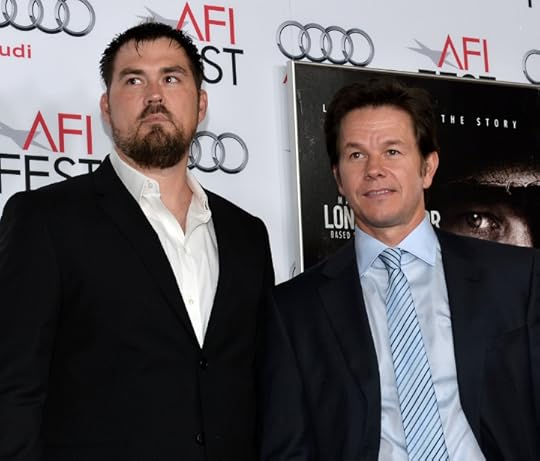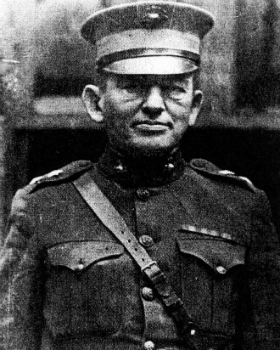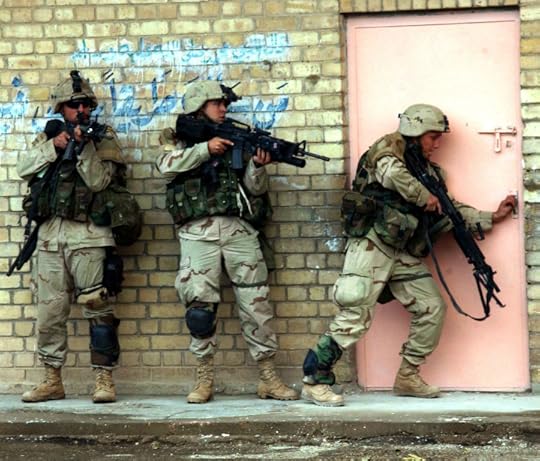Thomas E. Ricks's Blog, page 69
January 15, 2014
A tart verdict on the NSA review panel

Wittes dives in and emerges
quite underwhelmed. His advice: "Don't
pack a review group panel with law professors and expect either brevity, focus,
or political sophistication in the result."
And a New America bonus!: The stats indicate
that officials are hyping
how much the NSA metadata helps catch
terrorists.
Yes, Marcus. They did die in vain.

By Jim Gourley
Best Defense bureau of the military and American
culture
"We spend our whole lives
training to defend this country, and then we were sent over there by this
country, and you're telling me because we were over there doing what we were
told by our country that it was senseless and my guys died for nothing?"
That was how former
Navy SEAL and Lone Survivor author Marcus Luttrell responded to CNN's Jake Tapper during an interview about the new movie
based on his book, about an ill-fated mission in Afghanistan in which 19 of his
fellow Navy SEALs were killed by enemy forces. There has been much furor in the
national press over the exchange since it aired. The majority of commentators
have rallied to Luttrell's side, affirming that his comrades did not die in
vain. Their arguments focus on honoring the fallen, their dedication to their
country and their courage in combat. But we confuse valor with vanity at great
peril to the living and the future of our wars. We need a more honest answer,
however painful it may be to hear.
Yes, Marcus. Your
friends died in vain. They went selflessly. They fought bravely. They
sacrificed nobly. They lived in the best traditions of duty, honor, and country
-- hallowed words which dictate what every American can and ought to be. But
they died in vain for the exact reason that they went where their country sent
them and did what their country told them to do. America failed you because it
failed its obligation to those principles. It gives me no pleasure to write
these words, because it applies as much to the friends I lost as it does to
yours. But it needs to be said, because the sooner we acknowledge it as a
country, the more lives we might save.
As I write this,
America is two weeks into its 13th and presumably last year of war in Afghanistan.
Already, two servicemembers have been reported killed there. The strategic
outlook after our withdrawal is not optimistic. Indeed, current events forebode
a harsh future for Afghanistan. We are only two years removed from our
withdrawal from Iraq and the al Qaeda flag flies over the city of Fallujah, in
which more than 120 American servicemembers died. The ultimate failure of
American military might to secure Fallujah does nothing to diminish the
honorable nature of their service. But likewise, all their gallantry cannot
change the fact that they died for an unfulfilled cause. The honor is theirs
alone. The disgrace belongs to America.
It's the disgrace of
a country that abandoned its civic duty to execute due diligence in weighing
the decisions of whether and how to go to war, and then later to hold
accountable those that spent precious blood and vast treasure for meager gains.
All the while, we convinced ourselves that we were supporting our fighting
forces simply by saying that we were. We even made bumper stickers to prove it,
never considering what it said about us to wear our hearts next to our exhaust
pipes.
The sentiment of
upholding the bravery of the fallen to hide the shame of our culpability has
been echoed more eloquently but no less cowardice by our national leaders. In
his first campaign, our own Commander in Chief was immediately cowed by the
reaction to his suggestion that we were spending lives fruitlessly in our wars:
"I was actually upset with myself when I said that, because I never
use that term [referring to "lives wasted in combat"]. It is not at
all what I intended to say, and I would absolutely apologize if any [military
families] felt that in some ways it had diminished the enormous courage and
sacrifice that they'd shown."
When asked if
American troops in Iraq were dying in vain in 2005, Gen. George Casey answered
thusly: "No, I don't worry about that. Not yet -- we're not there
yet."
But he excused
himself from proposing a time in the future when that might hold true. And just
last year Adm. Mike Mullen expressed the idea in the most definitive of terms: "How
could it be that in a democracy -- a free society -- men and women may risk
their lives to defend that freedom and lose those lives in vain? It cannot be
so."
That was a
bastardization of the Gettysburg address. His thesis ran contrary to Lincoln's
original remarks. In Lincoln's view, the fallen "consecrated [the field of
battle] far above our poor power to add or detract," but the domain of
their honor went no further than the burial ground. The president stated
explicitly that the cause for which they died could only be made worthy by the
citizens who survived them. "It is rather for us here to be dedicated to
the great task remaining before us ... that these dead shall not have died in
vain..."
The proposition of
soldiers dying in vain was a very real concern leading to the eventual end of
that war, as Robert E. Lee wrote in his General Order No. 9, announcing his
surrender:
"But feeling that valour and devotion could accomplish nothing that
could compensate for the loss that must have attended the continuance of the
contest, I have determined to avoid the useless sacrifice of those whose past
services have endeared them to their countrymen."
Gen. Dwight
Eisenhower expressed the same ethic in June 1944 when he pre-scripted his
announcement of D-Day's possible unfortunate outcome: "The
troops, the air and the Navy did all that Bravery and devotion to duty could
do. If any blame or fault attaches to the attempt it is mine alone."
Throughout history,
our nation's greatest leaders have understood on a deeply personal level that
however honorably a soldier acquits himself, he can die in vain, and that it is
the responsibility of the leaders and citizenry to see to it that they don't.
Our country has lost its sense of that responsibility to a horrifying extent.
Our generals have lost the capability to succeed and the integrity to admit
failure. Our society has lost the courage and energy to hold them accountable.
Over the last decade, our top leaders have wasted the lives of our sons,
daughters, and comrades with their incompetence and hubris. After each failure,
our citizens have failed to hold them accountable, instead underwriting new
failed strategies as quickly as their predecessors with our apathy and sense of
detachment. And then we use the tired paeans of "never forget" and
"honor the fallen" to distract ourselves from our guilt in the
affair. When we blithely declare that they did not die in vain, we deface their
honor by using it to wipe the blood from our hands.
We have lost our
collective ability to win a war as well as the strength of character to accept
defeat. And in the end, it is those who represent the epitome of that character
we lack that pay the price. Can there be a death any more in vain than one that
secures for us freedoms that we hold in such low regard as to not even use them
on behalf of those that protect us? If there is, I cannot think of one.
It is my greatest
hope that Luttrell's response opens a national dialogue on this subject, and
that people finally embrace the true, terrible nature of our self-inflicted
losses. Let us as a nation finally feel the guilt we ought to for failing our
civic duty. And let that be what we remember before we send the next servicemember
to battle. For surely, there will be a next war. When it comes, let us be a
nation of people who are as faithful to our principles and considerate of our
obligations as those who fight for us. Let us be worthy of their sacrifice.
That is the only way to prevent them from dying in vain.
Jim Gourley is an
author
, journalist,
and former military intelligence officer.
January 14, 2014
The Gates files (II): Some revelations and tidbits about the Bush 43 administration

Almost all the media
attention devoted to Robert Gates's lively new memoir, Duty, is about
his criticisms of Joe Biden and other members of the Obama administration. But
there is lots more to it.
Let's start with
some insights from the first part of the book, about his time in the last two
years of the Bush administration.
To understand Dick
Cheney, it is necessary to remember that he served in the White House during
the Ford years, which Gates terms "the nadir of the modern American
presidency."
The best
questioner on the Iraq Study Group (a congressionally mandated review in the
fall of 2006) was Sandra Day O'Connor, who had little experience in national
security issues. "It was extraordinary to listen to her. From her years as a
Supreme Court justice, she had an amazing ear for faulty logic, questionable
evidence, inconsistency, and flawed analysis."
Gates states that
on Nov. 5, 2006, when he first discussed becoming defense secretary with
President Bush, that Bush told him he was looking at replacing Gen. George
Casey in Iraq with Gen. David Petraeus. This is a month earlier than I have
seen Petraeus mentioned as being on Bush's mind as Casey's replacement.
At his
confirmation hearing, listening to senators complain and fight, he thought to
himself, "I have walked right into the middle of a category five shitstorm."
He considered the
post-invasion handling of Iraq to have been "amazing bungling." Unusually for
this book, he doesn't name names.
When President
Bush told the Joint Chiefs on Dec. 13, 2006, that he was considering a "surge"
of troops to Iraq, "All of the chiefs unloaded on him." Gates, who was in the
room but not yet confirmed as defense secretary, "was struck by the service
chiefs' seeming detachment from the wars we were in."
When he travelled
to Baghdad a few days later in a C-17 with a small trailer inside it for him to
sleep in, "it was a lot like being FedExed halfway around the world."
In Baghdad, he met
with Ray Odierno, then the no. 2 officer in Iraq, who "warned me regarding
Casey's plan" for the way forward in Iraq.
Marine Gen. Peter
Pace was dumped as chairman of the Joint Chiefs after two years because of the
number of Republican senators (Warner, Chambliss, Graham, and McCain) who said
they would not like the idea of renominating him because it would turn into a
review of Iraq policy at a time when Republicans were sick of defending the
Bush administration's handling of that war. "I had, for all practical purposes,
sacrificed Pete Pace to save the surge. I was not proud of that."
President Bush, in
a discussion of Iraq policy in mid-2007, turned to Gates and said, "Somebody
has got to be risk-averse in this process, and it better be you, because I'm
sure not."
Iran was paying
Iraqi legislators $250,000 each to vote against the Status of Forces Agreement
with the United States, Petraeus told Gates.
(Much more to come)
Today's puzzler: Which Army division was commanded by a Marine general?

Hint: It was before you were born.
A better explanation than Churchill's of the Pashtun worldview: We make men!

A Canadian reader writes in to respond to the
quotation I ran from Churchill
about Pashtuns. He argues this is a better one, and I agree. He writes:
--
By Laeeque K. Daneshmend
Best Defense guest columnist
Evelyn Howell writes
this in the preface of his monograph "Mizh,"
first published in 1929. Howell had been the "Resident Political Agent" in
South Waziristan during the mid-1920s:
"I spoke above of political
agents as the custodians of civilization. Against this definition, if he were
to hear it, I am sure that Mehr Dad, or any other intelligent Mahsud malik,
would emphatically protest. Their argument, which is not altogether in the
sub-conscious plane, may be stated thus --
'A civilization has
no other end than to produce a fine type of man. Judged by this standard, the
social system in which the Mahsud has been evolved must be allowed immeasurably
to surpass all others. Therefore let us keep our independence and have none of
your qanun [law (and order)] and your
other institutions which have wrought such havoc in British India, but stick to
our own riwaj [(tribal) custom] and be
men like our fathers before us.'
After prolonged and
intimate dealings with the Mahsuds I am not at all sure that, with
reservations, I do not subscribe to their plea."
Laeeque K. Daneshmend
is a professor at Queen's
University, Kingston, Ontario, Canada.
January 13, 2014
The Gates files (I): Forget Rumsfeld's rules, this sec def had his own way to roll

It struck me when
reading the memoirs of Robert Gates that he effectively lists a bunch of rules
for living and working in Washington that are pretty good, and perhaps more astute than the
famous collection of rules compiled by Donald Rumsfeld, a less successful defense secretary. Here is my selection
of his instructions, all of them offered in his hot new
book:
Don't
always show your hand: "I believed that I would maintain maximum leverage in
the process ... if the other players did not know exactly what approach I
supported."
Likewise,
go easy on television appearances. "When it comes to the media, often less is
more, in the sense that if one appears infrequently, then people pay more
attention when you do appear."
But
use your prominence to set an example internally. "If I could make time to try
to help a single soldier, then by God so could everyone else in authority."
Get
real. "I'd been around long enough to know that when the head of a cabinet
department says his organization has no problems, he is either lying or
delusional."
Not
new, but well put: "This tactic of using high-level reviews to buy time was one
I would use often as secretary."
Know
what you want out of a meeting before you go into it. "A meeting in the
Situation Room was never just another gathering for me: outcomes were
important, and I always had a strategy going in."
Get
on top of acquisition. If you don't, "Congress will fuck it up."
You
can't have a government without a budget. And that means, "For everyone in the
executive branch except the president, the Office of Management and Budget is
the villain."
Understanding
the Pentagon: "The Department of Defense is structured to plan and prepare for
war but not to fight one."
When
you make a controversial decision, such as firing a top general, "be willing to
meet face-to-face with those most affected."
Don't
be afraid to plunge into details. "‘Microknowledge' must not become
micromanagement, but it sure helps keep people on their toes when they know
that the secretary knows what the hell he's talking about."
But
don't place too much faith in strategy documents produced by the bureaucracy.
"I don't recall ever reading the president's National Security Strategy when
preparing to become secretary of defense. Nor did I read any of the previous
National Defense Strategy documents when I became secretary. I never felt
disadvantaged by not having read these scriptures." (Tom: That said, I do
wonder whether such documents are perhaps useful as guidance to subordinate
officials? But obviously not very much if the SecDef doesn't know or care what
they say.)
His
"proven formula for deep thinking": a dinner of "martinis, steak and red wine."
The Future of War (I): A New America project looking at 21st century conflict

In the interest of improving our national security, protecting our
rights, and helping
get us out of the endless "war on terror," the New America Foundation is
launching a project on the future of war. Here is a look at the initial
thinking, which is liable to change as our various participants bring to bear their very different areas of expertise.
Plus, isn't it time that there was a study of the future of
defense funded by neither the Pentagon nor the defense industry?
***
By the Future of War
team, New America Foundation
Best
Defense office of the future
Throughout history, changes
in the conduct of warfare have been one of the primary drivers of shifts in how
societies and states are organized. Today, the evolution of autonomous weapons
systems, the emergence of ever more sophisticated surveillance technologies,
the militarization of cyberspace and outer space, and a range of similar
developments are dramatically changing the nature of war -- with profound
implications for the nature of the international order,
the manner in which we control and constrain power and violence, and the nature
of the state itself.
Few seem fully to grasp this, however.
For the most part, these changes in the means and methods of warfare are
usually viewed narrowly, and understood as matters of interest mainly to
specialized communities of policy wonks, military planners, civil libertarians,
or counterterrorism experts. As with the story of the blind men and the
elephant, many people are looking at different facets of the changing nature of
war, each trying to describe what they see (and often misunderstanding what it
is they are seeing). That's not good enough: We need to look at the whole
elephant.
With the United States still locked
into a "forever war" paradigm that doesn't comport with American values or
history, it's more urgent than ever to understand the ways in which changes in
the nature of war both drive and are driven by changes in state-level,
sub-state-level, and international policies and institutions. At the same time
states are developing unprecedented military technologies, the means of mass
destruction have been democratized: Today, terrorist organizations and other
non-state actors can cause damage and destruction on a scale we normally
associate with states. Meanwhile, new technologies are eroding old assumptions
about sovereignty and state autonomy. Nonetheless, we still operate mainly
within a legal and political paradigm that draws sharp -- if increasingly
arbitrary-- lines between domestic and international matters, between states
and non-state actors, and between war and crime.
It's increasingly apparent that
existing legal paradigms neither provide adequate tools for responding to new
kinds of threats nor offer an appropriate framework for protecting human rights
and human dignity. As we move forward, we need to find a way to evolve beyond
the post-9/11 state of perpetual war -- and we need to do so in a way takes
into account these seismic changes, allows for an adaptive response to evolving
threats, and enhances the robust protection of human rights.
The New America Foundation
is well positioned to sort out the thorny issues that arise from the changing
nature of warfare. Unlike most think tanks and NGOs, New America isn't made up
of specialists having "insider" conversations with one another: lawyers talking
to other lawyers, or defense policy experts talking to other defense policy
experts. Instead, New America connects the worlds of law, technology,
political science, history, policy, the military, the human rights community,
and the media, each of which often operates in isolation.
Core members of New America's Future of
War team include journalists, technologists, military history and terrorism
experts, human rights experts, and international law and defense policy
experts. Our individual and collective expertise and connections enable us to
convene the most creative and influential thinkers, writers, and
decision-makers from these varied and often separate worlds; develop bold
conceptual frameworks combined with more specific legal and policy
proposals; write and talk about these intelligibly and interestingly; and
attract extensive media coverage to our work and our recommendations.
The Future of War project is led by Peter
Bergen, director of national security studies at the New America
Foundation and the author of several
books. This series
was drafted by him and the team's other members: Rosa
Brooks, Anne-Marie
Slaughter, Sascha
Meinrath, and Tom Ricks.
3rd Fallujah? I got nothing on that for you. But we happily kicked butt at 2nd Fallujah.

By
"Seth M."
Best
Defense guest memoirist
Former 3/1 Marine and veteran of
Fallujah II here. I'll admit that the recent events in Anbar have been
disheartening, to say the least. As you're aware, the news of Fallujah, Karmah,
parts of Ramadi, etc. falling into ISIS/AQI hands has been accompanied by a
narrative that these events have somehow made the Iraq War not worth fighting,
on balance, Paul Szoldra's "Tell Me Again, Why Did My Friends Die
in Iraq?"
being the most prominent example.
I posted a comment to Facebook the
other day, to the effect that it could be worse -- imagine being a Vietnam
veteran and seeing the fall of Saigon in 1975. Most of the comments from my 3/1
friends were of slight anger, to the cynical resignation of "I'm surprised
it took this long." Then a hard-charging machine gunner from our company
posted:
"You
know what I hate worse? Being portrayed as some unfortunate creature because of
this, the vast majority of us were overjoyed for the opportunity to get in a
real fight. Stop treating us like weak little pussies in the media; we're men,
fighting men."
Going back to November 2004 this is
true. Having sat in Karmah since June, taking mortar, rocket, and IED attacks
on a near-daily basis, I Co. 3/1 knew that a sizable share of our enemy and his
weaponry were coming from the city not 10 kilometers to the due southwest.
Almost to the man, we were looking forward to seizing Fallujah (one guy from K
Co. tried to shoot himself in the foot but only hit the webbing between his
toes, an exception). As we got along in the seven-month tour, the biggest
concern became that the battle would be postponed for this reason or that until
January, after 3/1 rotated out of theater and we would miss it.
The battle for Fallujah might have been about the future of
Iraq at the political/strategic level, or about stabilization at the
operational level. But at the personal level it was never much more than a
punitive mission, and one that we were eager to fight at that. We accepted this
mission with a happy heart despite its costs. Current events haven't changed
that.
"Seth M." served in the U.S. Marine Corps
from 2001 to 2005 and deployed in support of OIF I and OIF II. He lives in
Washington, D.C., and works as an analyst for the federal government. He
harbors ambivalent feelings about the Iraq War.
January 10, 2014
The more I listen to American intelligence officials, the more I edge toward Snowden

I've been really ambivalent about Edward
Snowden, especially since he landed in Russia. At the
outset I thought he
clearly was wrong, akin
to British defectors Kim Philby or Guy Burgess. Yet I have been struck that
everyone under the age of 30 I've asked thinks he's a hero. That has made me
think some more.
I am not
yet on his side, but I think I am becoming more
sympathetic to him. I thought a lot about this over the Christmas break. I see
four questions here:
Did he do the right thing?
Did he at the same time commit a crime?
Are the activities of the U.S. intelligence
community that he exposed legal?
If so, are they wise?
It is possible that Snowden did the right thing
but in the wrong way. Indeed, he may have helped the United States but
committed a crime in doing so.
Yet that begs the question: What would have been the right way?
Especially given the reckless disregard for the law shown by American national
security officials over the last decade, he was right to be wary of going the
civil disobedience route. We've seen the killing of American citizens held to
be "enemy combatants," and intelligence officials certainly talk about Snowden
as an enemy who has inflicted severe damage on their operations. Add two and
two and you get a secret execution warrant for one Edward Snowden. Is that
speculative? Absolutely. Ridiculous? Not if you have been paying attention to
the erosion of boundaries (between civilian and military, war and peace, public
and private, and most especially the militarization of intelligence
operations).
I also think that the
U.S. intelligence community, by simply insisting that it is doing the right
thing and that Snowden is a contemptible traitor, end of discussion, is going
to wind up the loser in this conversation. One well-informed person I know comments that this
failure to engage seriously now presents "an existential threat to the entire
USIC's ability to operate with the support of the American people, Congress and
the media." (He says the solution is to strengthen the director of
national intelligence and give that office the powers actually envisioned by
the 9/11 Commission, such as budget authority and direct regulatory oversight
over all member agencies. That is, of course, another issue, but an important
one.)
I especially am becoming more sympathetic to
Snowden the more current and former American intelligence officials talk about
killing Snowden and holding
forth in other ways. Bart
Gellman, one of the reporters who has broken a lot of
Snowden's news, wrote of a confrontation with a self-righteous general last
summer, who angrily said to him, "We didn't have another 9/11 [because intelligence enabled
warfighters to find the enemy first]. Until you've got to pull the trigger,
until you've had to bury your people, you don't have a clue."
First, we have
buried our people.
Second, until there is more
accountability for the crimes committed by U.S. intelligence officials over the
last 10 years, I am not inclined to let secret policemen and spies be the moral
arbiters of our society or the interpreters of our constitutional rights -- in
fact, I think the burden is on them, not on me. I was not the one who tortured people, kidnapped others,
delivered captives into the hands of governments we knew would torture them,
and also wormholed some of our constitutional rights. And I didn't allow 9/11
to happen in the first place, and then get all panicky after that. If we are to
ask if Snowden damaged U.S. intelligence operations, we also need to ask how
much U.S. intelligence operations damaged the United States over the last 10
years. They will tell you that there is secret evidence of all the attacks they
stopped. I will tell you that there is secret evidence of all the laws they broke
-- or at least, there was such evidence, until the tapes were destroyed. There
are a lot of people calling for accountability for Snowden who seem blind
to the much larger crimes committed by U.S. intelligence officials.
January 6, 2014
Did the Iraq Surge finger Sunni insurgents for Maliki and his allies?

Almost every day, it
seems, Aswat
al-Iraq carries news
stories about former members of the Sahwa movement (the Sunni insurgents who were put on the American payroll but not disarmed
during the Surge of 2007-08) getting whacked:
Interior Ministry sources
reported the killing of ex-pro-government Sahwa (Awakening) member by unknown
gunmen in Abu Ghraib area, west Baghdad.
The source told Aswat al-Iraq that the gunmen stormed
into the deceased house and killed him with his family.
The family comprised of two
women and two children.
Tom again: This
pattern of killings makes me wonder if the Surge effectively surfaced and identified the
local leadership network of Sunni insurgents, and whether that knowledge is now
being used by Prime Minister Maliki and his allies in the low-grade civil war that has resumed in central Iraq.
If so, did the
Americans "let a hundred flowers bloom" -- and so create the conditions for the
harvesting of those Sunni flowers? By so doing, did we enable a quiet Iranian
offensive inside Iraq? If so, I suspect that we did not, in Maoist terms, correctly "handle the contradictions among the people."
On Saturday, the Iraqi army shelled Fallujah.
It looks like it
and Ramadi are going back into the hands of al Qaeda.
Thomas E. Ricks's Blog
- Thomas E. Ricks's profile
- 437 followers



